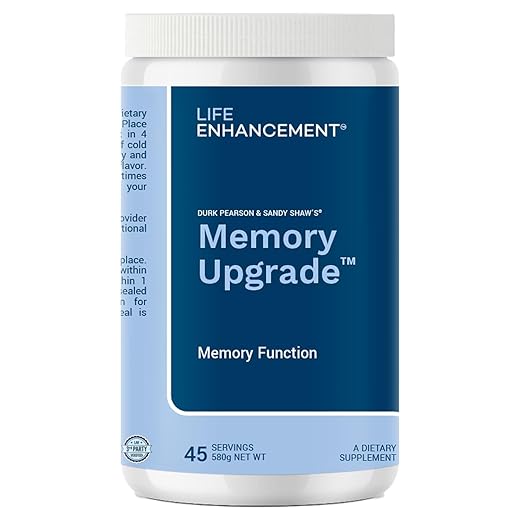In this step-by-step guide, I will show you how exercise can improve your memory. By following these simple steps, you can enhance your ability to remember and retain information for longer periods. Get ready to exercise your way to a better memory!
Boost Your Brainpower with These Bestsellers



Understand the Connection
To understand the connection between exercise and memory, follow these steps:
- Learn about increased blood flow: Engaging in physical activity, such as aerobic exercises or even a brisk walk, increases blood flow to the brain. This improved circulation delivers more oxygen and nutrients to brain cells, which can enhance memory and cognitive function.
- Understand the role of neurogenesis: Exercise stimulates the production of new neurons in the hippocampus, a region of the brain associated with memory and learning. These newly formed neurons can help improve memory consolidation and retrieval.
- Recognize the importance of neural connections: Exercise strengthens the connections between existing neurons. This process, known as neuroplasticity, enhances communication between brain cells and improves the overall efficiency of the brain’s neural networks, leading to better memory function.
For example, engaging in regular aerobic exercises like running or cycling can increase blood flow to the brain and stimulate the growth of new neurons. Similarly, practicing activities that require coordination and balance, like dancing or yoga, can strengthen neural connections and improve memory.
Remember, understanding the connection between exercise and memory can motivate you to incorporate physical activity into your routine and reap the cognitive benefits it offers.



Choose Aerobic Exercises
- Run, swim, or cycle regularly to engage in aerobic exercises.
- These activities increase your heart rate and oxygen levels, stimulating brain function and improving memory.
- Incorporate aerobic exercises into your routine to experience the positive impact on memory.
Include Strength Training
Include Strength Training:
To incorporate strength training exercises into your routine, start by choosing exercises that target major muscle groups such as squats, push-ups, or lunges. Aim to perform these exercises at least two to three times a week, gradually increasing the weight or resistance over time. For example, you could start with bodyweight squats and progress to using dumbbells or a barbell as you get stronger. Remember to always maintain proper form and technique to prevent injury and maximize the benefits of your strength training workouts.
Practice Mindful Movements
Engaging in mindful movements, such as yoga or tai chi, can have a positive impact on your memory and cognitive function. These activities involve slow, deliberate movements and deep breathing, which help to calm the mind and reduce stress. For example, practicing yoga poses like the tree pose or the downward dog can improve balance and focus, while tai chi movements like the cloud hands or the snake creeps down can enhance coordination and mental clarity. Incorporating these mindful movements into your daily routine can be as simple as finding a quiet space, following along with online videos or attending a class, and dedicating a few minutes each day to focus on your breath and body movement. So, why not give it a try and experience the benefits of mindful movements for yourself?
Prioritize Regularity
Engaging in regular physical activity is essential for improving memory. Make it a habit to prioritize consistency by aiming for at least 150 minutes of moderate-intensity exercise or 75 minutes of vigorous exercise each week. Incorporate activities that you enjoy and can easily fit into your schedule to ensure you stay committed to regular exercise. Remember, consistency is key to reaping the benefits of exercise for memory enhancement.
Combine Exercise with Brain-Boosting Activities
To maximize the benefits, combine exercise with brain-boosting activities. Solve puzzles, play memory games, or engage in activities that challenge your cognitive abilities. This combination stimulates different parts of the brain and enhances memory improvement.
To engage in brain-boosting activities, try solving crossword puzzles or Sudoku. These games require you to think critically and exercise your problem-solving skills. Additionally, playing memory games like “Simon Says” or using memory cards can help enhance your cognitive abilities. Lastly, participating in activities that challenge your brain, such as learning a new language or playing a musical instrument, can provide a great cognitive workout. By combining these activities with exercise, you’ll be able to reap the benefits of a sharper mind and improved memory.
Ensure Proper Nutrition
Ensure Proper Nutrition
A healthy diet plays a vital role in memory enhancement. To improve your memory, follow these steps:
- Opt for a balanced diet: Include a variety of fruits, vegetables, whole grains, and lean proteins in your meals. These foods provide essential nutrients that support brain health and memory function.
- Stay hydrated: Drink plenty of water throughout the day to keep your brain properly hydrated. Dehydration can negatively impact cognitive function and memory.
- Avoid excessive alcohol consumption: Limit your alcohol intake, as excessive alcohol consumption can impair memory and cognitive abilities. Stick to moderate drinking or consider abstaining altogether.
By following these guidelines and making nutritious choices, you can support your memory function and overall cognitive health.
Get Enough Rest
Adequate sleep is crucial for memory consolidation. Aim for 7-9 hours of quality sleep each night to allow your brain to process and store information effectively. Create a bedtime routine that promotes relaxation, such as reading a book or taking a warm bath. Keep your bedroom cool, dark, and quiet to create a conducive sleep environment. Avoid electronic devices and caffeine close to bedtime. Stick to a consistent sleep schedule, even on weekends, to regulate your body’s internal clock. Prioritize sleep as an essential part of your daily routine to optimize your cognitive function and overall well-being.
The Power of Physical Activity
In conclusion, I hope this blog post has provided you with valuable insights on how to improve your memory through exercise. By incorporating aerobic exercises, strength training, mindful movements, regularity, brain-boosting activities, proper nutrition, and sufficient rest into your routine, you can enhance your cognitive function and enjoy a sharper memory. Remember, consistency is key, so commit to these lifestyle changes and reap the benefits of a more efficient memory. Keep exercising and keep your mind sharp!
Effective Memory-Boosting Techniques
Getting the most out of your memory enhancement tools
- Start with a daily routine: Establish a consistent schedule for using memory enhancement tools. Set aside a specific time each day to dedicate to memory exercises or activities
- Use mnemonic techniques: Mnemonic techniques can be highly effective for improving memory. Try using acronyms, visualization, or association techniques to help remember information more easily. For example, creating a vivid mental image or linking new information to something you already know
- Practice active recall: Instead of simply reading or studying information, actively engage with it by trying to recall it from memory. Test yourself periodically to reinforce what you’ve learned and strengthen your memory
- Utilize digital tools: Take advantage of the various digital tools available for memory enhancement. There are numerous mobile apps and online platforms specifically designed to help improve memory and cognitive skills. Explore these tools to find ones that suit your preferences and needs
- Stay physically and mentally active: Engaging in regular physical exercise and participating in mentally stimulating activities can have a positive impact on memory function. Physical exercise increases blood flow to the brain, while mental activities like puzzles, learning a new language, or playing memory games can help keep your brain sharp
- Remember, these are just a few suggestions to get started with memory enhancement tools. Feel free to adapt and customize these strategies to find what works best for you. Happy memory boosting!
Frequently Asked Questions about Memory Enhancement Tools
Sure! There are several memory enhancement apps and software that are worth trying if you’re looking to boost your memory skills. Here are a few popular ones:
- Lumosity: This app offers a wide range of brain-training games designed to improve memory, attention, and problem-solving skills. It provides personalized training based on your performance and tracks your progress over time.
- Elevate: Known for its sleek design and user-friendly interface, Elevate offers a variety of brain-training exercises to improve memory, focus, and cognitive skills. It also provides detailed performance tracking and adaptive training plans.
- Peak: With over 30 games and challenges, Peak aims to improve memory, attention, problem-solving, and mental agility. It offers personalized workouts, insights into your cognitive strengths and weaknesses, and allows you to compete with friends.
- CogniFit: This app combines cognitive assessment tests with personalized brain-training exercises. It targets memory, attention, and other cognitive abilities. CogniFit also provides in-depth analysis of your cognitive performance.
- Memorado: Offering a mix of fun games and exercises, Memorado aims to improve memory, concentration, and logic skills. It adapts to your specific needs and tracks your performance over time.
Yes, memory enhancement tools can indeed help with age-related memory decline. There are various techniques and tools available that can aid in improving memory and cognitive function in older adults. These tools typically focus on exercising the brain and stimulating neural connections, which can help slow down or even reverse the effects of age-related memory decline.
One popular tool is brain training exercises or cognitive training programs. These programs involve engaging in mental exercises specifically designed to challenge and stimulate different cognitive functions, such as memory, attention, problem-solving, and reasoning. Research has shown that regular participation in these brain training exercises can lead to improvements in memory performance and overall cognitive abilities.
Another effective memory enhancement tool is the use of memory aids. These can include physical tools such as calendars, planners, and reminder apps, as well as mnemonic techniques like acronyms, visualization, and chunking. These aids can assist in organizing and retaining information, making it easier to recall later on.
Additionally, maintaining a healthy lifestyle can significantly contribute to memory enhancement. Regular exercise, a balanced diet, sufficient sleep, and stress management can all positively impact cognitive function and memory.
It’s important to note that while memory enhancement tools can be beneficial, they might not completely reverse age-related memory decline. It’s always recommended to consult with a healthcare professional for personalized advice and to explore the most suitable options based on individual needs and circumstances.









In addition to exercise, I’ve found that incorporating meditation and mindfulness into my daily routine has also helped improve my memory. It’s a great way to calm the mind and enhance focus. Have you tried combining exercise with mindfulness?
I followed the guide and have been exercising regularly, but I’ve been experiencing some difficulty in maintaining a consistent routine. Any tips on how to stay motivated and prioritize regular exercise?
Can you recommend any brain-boosting activities that can be combined with exercise? I’m looking for some new ways to challenge my mind while working out.
Certainly! Along with the suggestions mentioned in the guide, you can also try activities like solving puzzles, playing memory games, or learning a new skill or language. These activities engage your brain while you exercise, providing a dual benefit.
I really enjoyed reading this guide! I’ve always heard that exercise is good for the brain, but it’s great to see the specific steps laid out. I’m curious, though, why is aerobic exercise recommended over other types? Are there any specific aerobic exercises that are particularly effective for improving memory?
This guide was very informative! I would love to see more articles about brain-boosting activities that can be combined with exercise. Maybe something about puzzles or memory games? Keep up the great work!
Thank you for your feedback! I’m glad you found the guide helpful. I will definitely consider writing an article about brain-boosting activities that can be combined with exercise. Stay tuned!
I followed this guide for a few weeks now and I can already notice a difference in my memory! It’s amazing how exercise can have such a positive impact. Thank you for sharing these tips!
That’s fantastic to hear! I’m so glad the guide has helped improve your memory. Keep up the great work and feel free to share any more insights or experiences you have!
I have a question about the ‘Mindful Movements’ step. Can you please explain what exactly it means to practice mindful movements and how it helps improve memory? Thank you!
I’ve heard that interval training can be a great way to boost cognitive function. Has anyone tried incorporating interval training into their exercise routine? I’d love to hear about your experiences!